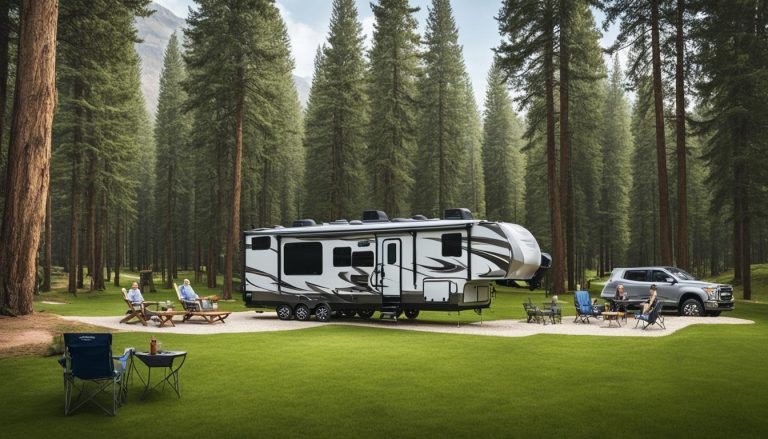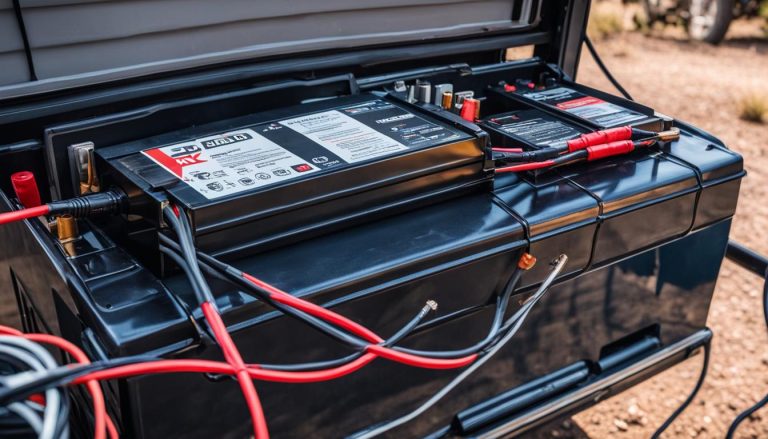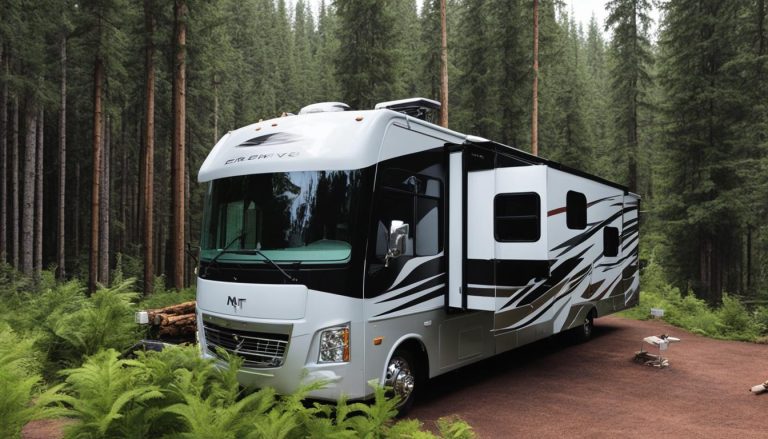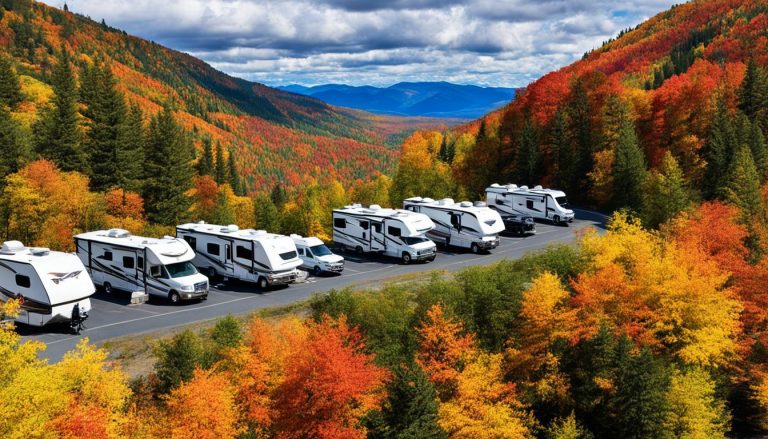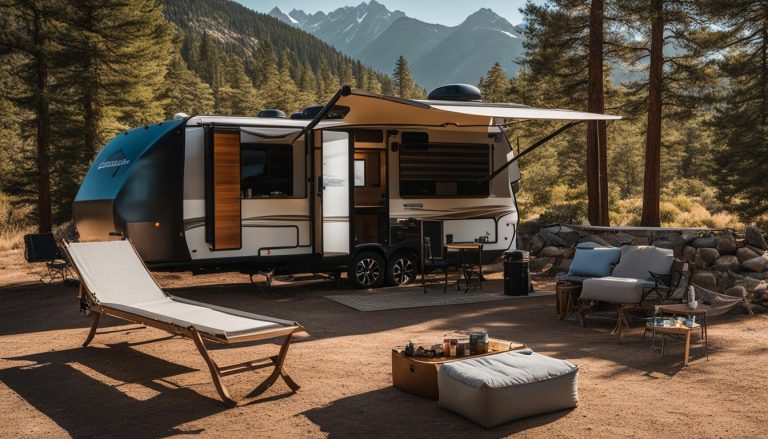Get High-Speed Internet in Your RV Today!
gorvlifestyle.com and its partners may earn a commission if you purchase a product through one of our links
RV ownership has increased by 62% in the last 20 years, and over 11.2 million American households own an RV. Whether you’re planning a cross-country trip or living a mobile lifestyle, having high-speed internet in your RV is essential. In this article, we will explore different RV internet options and help you find the best solution for your needs.
Key Takeaways:
- Discover the various RV internet options available to stay connected on the road.
- Consider satellite internet, mobile hotspots, free Wi-Fi, and home provider plans.
- Evaluate factors such as service availability, data limits, and contract requirements.
- Find the best internet solution that suits your travel plans and usage needs.
- Ensure you have a backup plan for uninterrupted internet connectivity while on the go.
Satellite Internet for RVs
If you’re an RV owner planning to park your vehicle in one place for an extended period, satellite internet can be an excellent solution for your internet needs. Providers like Starlink, Viasat, and HughesNet offer specialized satellite internet plans designed specifically for RVs, ensuring reliable connectivity no matter where your travels take you.
Starlink, a popular choice among travelers, offers pay-as-you-go plans with speeds of up to 220 Mbps while in motion. This flexibility allows you to stay connected even when on the move. Viasat and HughesNet, on the other hand, provide data plans with unlimited data and coverage in all states, giving you peace of mind during your RV adventures.
It’s important to note that satellite internet requires a clear view of the sky to function properly. Additionally, while satellite internet is ideal for stationary RVs, it may have certain limitations when in motion. However, with the advancements in technology and the increasing availability of satellite internet options, staying connected on the road has never been easier.
Whether you’re a full-time RVer or embarking on a long-term journey, satellite internet can provide the reliable and high-speed connection you need to stay connected, work remotely, stream your favorite shows, and keep in touch with friends and family.
Mobile Hotspots for RVs
When it comes to staying connected while camping or traveling in your RV, mobile hotspots are a popular choice for their flexibility and convenience. Whether you want to check emails, stream your favorite shows, or stay connected with friends and family, a mobile hotspot can be your reliable companion on the road.
You have two options when it comes to mobile hotspots for your RV: using your smartphone as a mobile hotspot or purchasing a dedicated hotspot device. Both options have their pros and cons, so it’s important to choose the one that best fits your needs.
If you decide to use your smartphone as a mobile hotspot, make sure you have a data plan that supports tethering. Simply enable the hotspot feature on your smartphone, and it will create a Wi-Fi network that you can connect your devices to. This option is convenient if you already have a smartphone with a suitable data plan.
On the other hand, if you prefer a dedicated hotspot device, you can choose from providers like AT&T, Verizon, and T-Mobile, who offer specific data plans for mobile hotspots. These devices are designed to provide a strong and reliable Wi-Fi signal, allowing you to connect multiple devices simultaneously.
When selecting a mobile hotspot data plan, consider factors such as data limits, coverage, and pricing. Different providers offer various plans with different data allowances and speeds. It’s essential to choose a plan that aligns with your internet usage habits and fits within your budget.
Enhance Your Mobile Hotspot Signal with an RV Wi-Fi Booster
If you want to maximize your mobile hotspot’s signal strength and range, investing in an RV Wi-Fi booster is a smart choice. An RV Wi-Fi booster amplifies the existing signal, allowing you to connect to Wi-Fi networks from a greater distance.
Here’s how an RV Wi-Fi booster works:
- The external antenna captures the Wi-Fi signal from nearby networks.
- The signal is then amplified by the booster device.
- Your devices can connect to the boosted signal, even if you’re further away from the Wi-Fi source.
By using an RV Wi-Fi booster, you can overcome weak or unreliable signals, ensuring a more stable internet connection in your RV.
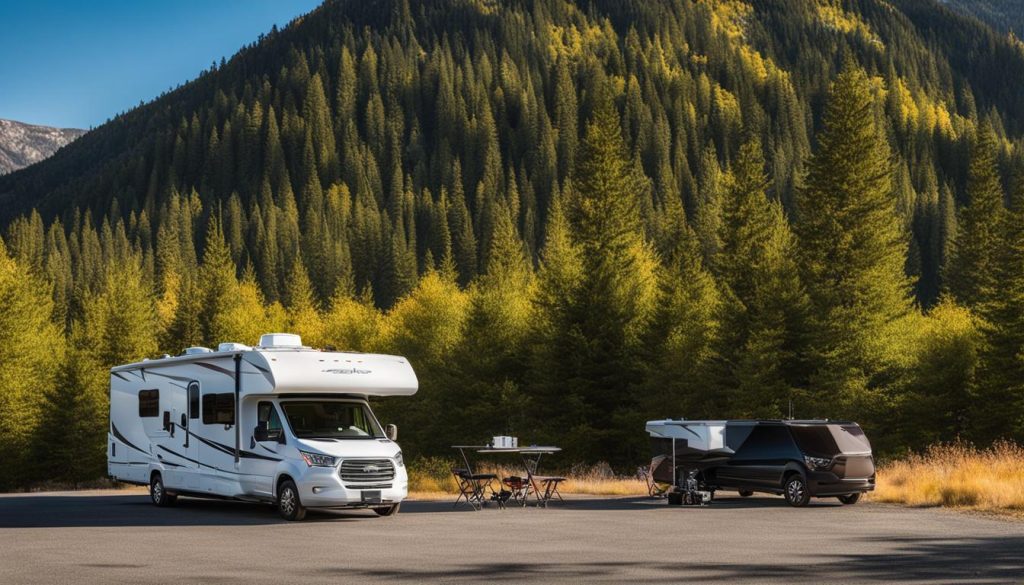
Whether you choose to use your smartphone as a mobile hotspot or opt for a dedicated hotspot device, staying connected in your RV has never been easier. With the right mobile hotspot and an RV Wi-Fi booster, you can enjoy the convenience of high-speed internet wherever you go.
Free Wi-Fi Options for RVs
If you’re looking for a budget-friendly option to stay connected while on the road, free Wi-Fi hotspots are a great solution. Many cafes, libraries, and public attractions offer free Wi-Fi, which can be accessed by RV owners like you.
These free Wi-Fi hotspots provide a convenient way to browse the internet, check emails, and connect with family and friends without incurring any additional costs. Whether you’re stopping for a quick coffee break or visiting a local park, you can take advantage of these complimentary Wi-Fi networks.
Some RV campgrounds also provide dedicated Wi-Fi connections for campers. These campgrounds understand the importance of internet connectivity for RV travelers and offer free Wi-Fi as an added amenity. Before choosing a campground, it’s always a good idea to check if they have reliable Wi-Fi available for guests.
“Free Wi-Fi hotspots at cafes, libraries, and public attractions provide a convenient and budget-friendly option for RV owners to stay connected while on the road.”
However, it’s important to keep in mind that free Wi-Fi networks may have limitations in terms of coverage and speed. They may not be as fast or reliable as dedicated RV internet options. Additionally, these networks are often shared among many users, which can affect the overall speed and performance.
Another factor to consider when using public Wi-Fi networks is the safety and security risk. Public Wi-Fi networks are not encrypted, which means your personal information could be at risk of being intercepted by hackers. It’s essential to exercise caution and avoid accessing sensitive information, such as online banking or private accounts, when connected to public Wi-Fi.
Despite these limitations, free Wi-Fi options can be a convenient way to stay connected while on a budget. By being mindful of their limitations and taking appropriate security measures, you can enjoy the benefits of staying connected without incurring any additional costs.
Benefits of Free Wi-Fi for RV Owners:
- Cost-effective way to stay connected
- Convenient access at cafes, libraries, and public attractions
- Some RV campgrounds provide free Wi-Fi for campers
- No additional expenses for internet connectivity
Considerations When Using Free Wi-Fi:
- Limitations in terms of coverage and speed
- Potential safety and security risks
- Not suitable for accessing sensitive information
- Shared network with other users
| Pros | Cons |
|---|---|
| Cost-effective | Limitations in coverage and speed |
| Convenient access at various locations | Potential safety and security risks |
| Some RV campgrounds offer free Wi-Fi | Shared network with other users |
| No additional expenses for internet connectivity |
Internet Plans from Home Providers
If you already have an internet service provider at home, you can take advantage of their hotspot network while traveling in your RV. Providers like Spectrum, Xfinity, AT&T, Verizon, and T-Mobile offer hotspot plans and portable mobile hotspots that allow you to stay connected on the go. These plans may require an additional fee, but they offer the convenience of using a familiar provider and network.
With the internet plans from home providers, you can enjoy reliable connectivity and access to high-speed internet just like you would at home. Whether you’re streaming your favorite shows, staying connected with friends and family, or working remotely from your RV, these plans provide a seamless internet experience.
Stay connected with your existing internet service provider while on the road with the following benefits:
- Consistency: By sticking with your home provider, you can enjoy the familiar features, network reliability, and customer support you’re accustomed to.
- Quality: Home internet providers offer fast speeds and robust coverage, allowing you to browse the web, stream videos, and upload files without interruptions.
- Flexibility: Many home providers offer portable mobile hotspots that you can take with you anywhere, ensuring a reliable internet connection on your RV adventures.
Comparison of Internet Plans from Home Providers
To help you make an informed decision, here’s a comparison table of the internet plans offered by popular home providers:
| Provider | Plan | Monthly Cost | Connection Type | Speed | Data Limit |
|---|---|---|---|---|---|
| Spectrum | Home Wifi + Mobile Hotspot | $50 | Wireless | Up to 100 Mbps | Unlimited |
| Xfinity | Xfinity Mobile Hotspot | $45 | Wireless | Up to 50 Mbps | Unlimited |
| AT&T | AT&T Mobile Hotspot | $50 | Wireless | Up to 100 Mbps | Unlimited |
| Verizon | Verizon Jetpack | $70 | Wireless | Up to 150 Mbps | 30 GB |
| T-Mobile | T-Mobile SyncUP DRIVE | $40 | Wireless | Up to 50 Mbps | 5 GB |
Keep in mind that these plans may have specific requirements or restrictions, such as the need to have an existing home internet subscription or limited data allocation. It’s essential to review the details of each plan and choose the one that best suits your internet usage needs and budget.
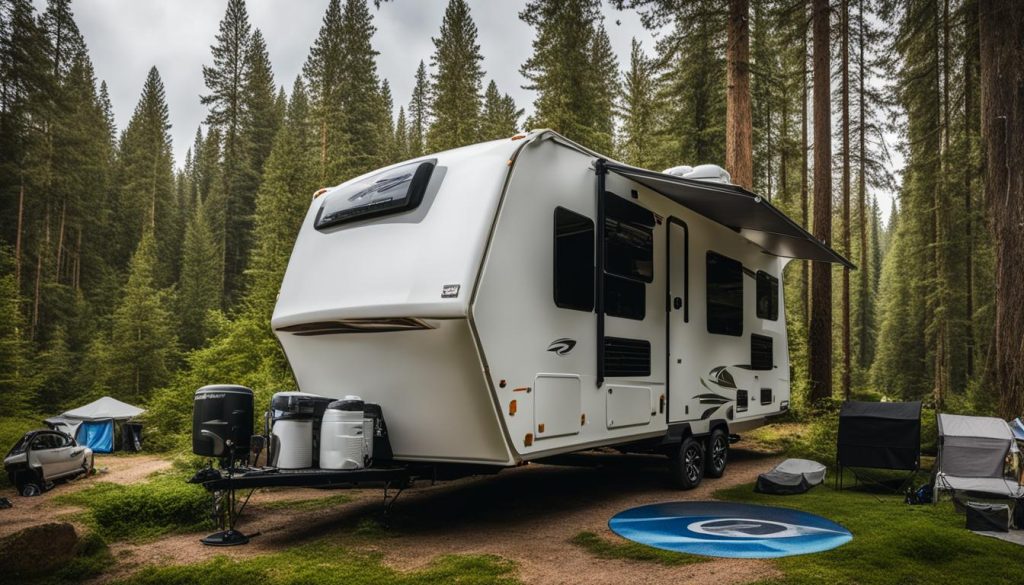
In addition to the information provided in the table, it’s worth exploring any promotional offers, discounts, or bundling options that may be available to you as an existing customer.
By leveraging the internet plans from home providers, you can enjoy seamless connectivity, reliable speeds, and the convenience of using a trusted network while living your RV lifestyle.
Considerations for RV Internet
When it comes to choosing the best internet for your RV living, there are a few important factors to consider. First and foremost, you need to assess the availability of the service. Depending on your travel destinations, some options may not be accessible in certain areas. Make sure to research coverage maps and check if the providers you’re interested in are available in the locations you plan to visit.
Data limits are another crucial consideration. Depending on your internet usage requirements, you may need an unlimited data plan or one that offers a generous data allowance. This is especially important if you enjoy streaming movies, video calls, or online gaming while on the road. Consider how much data you typically use and choose a plan that caters to your needs.
Contract requirements are also worth exploring. Understand the terms and conditions associated with each RV internet solution. Some providers offer flexible month-to-month plans, while others may require a longer commitment. Assess your travel plans and choose a contract length that aligns with your needs.
Lastly, speed is a crucial factor. Depending on your internet activities, you may need fast and reliable internet connectivity. If you work remotely from your RV or rely heavily on streaming and online gaming, prioritize plans with higher speeds. Conduct speed tests in different locations to get an idea of the actual speeds offered by different providers.
FAQ
How can I get high-speed internet in my RV?
There are several options for getting high-speed internet in your RV. You can choose from satellite internet, mobile hotspots, free Wi-Fi hotspots, or internet plans from home providers.
What is satellite internet for RVs?
Satellite internet is a solution for RV owners who plan to park their RV in one place for an extended period. Providers like Starlink, Viasat, and HughesNet offer satellite internet plans specifically designed for RVs.
How do mobile hotspots work for RVs?
Mobile hotspots allow you to use your smartphone or dedicated hotspot device to connect to the internet while on the go. Providers like AT&T, Verizon, and T-Mobile offer mobile hotspot data plans with varying amounts of data and coverage.
Can I rely on free Wi-Fi for my RV?
Yes, you can use free Wi-Fi hotspots available at cafes, libraries, public attractions, and some RV campgrounds. However, keep in mind that free Wi-Fi networks may have limited coverage and speed.
Can I use my existing home internet provider for my RV?
Yes, if you have an internet service provider at home, you can take advantage of their hotspot network while traveling in your RV. Providers like Spectrum, Xfinity, AT&T, Verizon, and T-Mobile offer hotspot plans and portable mobile hotspots.
What factors should I consider when choosing an RV internet solution?
When choosing an RV internet solution, consider factors such as availability, data limits, contract requirements, and speed. It’s also a good idea to have a backup internet plan, especially if you rely heavily on internet connectivity while on the road.

